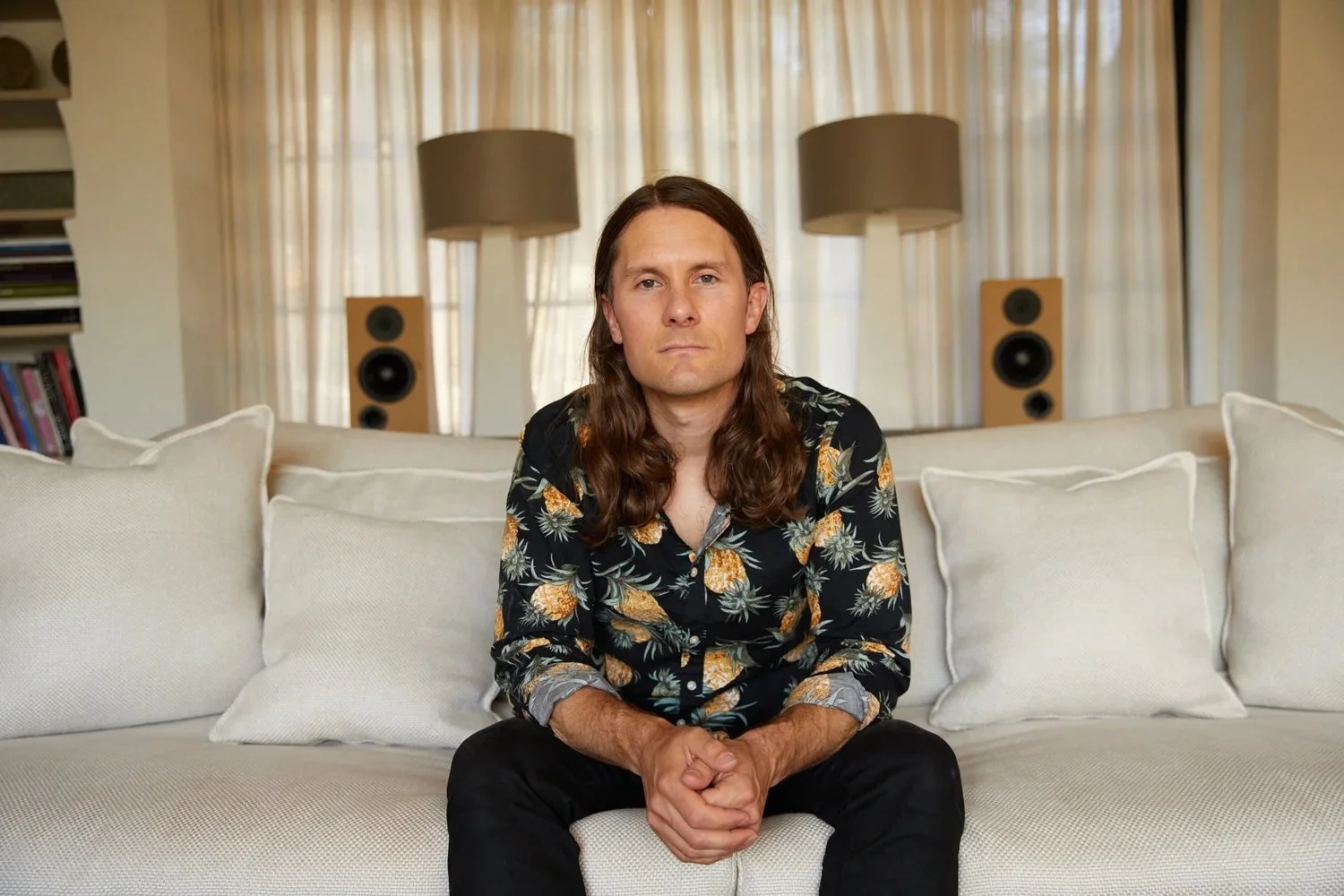Q&A: Nathaniel Paul Steps Into the Light with ‘Steady As We Go’
INTERVIEW
INTERVIEW
☆ BY STARLY LOU RIGGS ☆
NATHANIEL PAUL REFUSES TO GET PULLED INTO THE DARK—Paul’s music career began with longtime band The Bergamont, which he started with his wife Jillian Speece Paul in South Bend, IN. In the wake of pandemic lockdown, he switched gears, beginning a burgeoning solo project that’s launched three albums and a number of singles since 2020. Paul made the best of a hard time and continues to use his music as a way of staving off depression, focusing his energy on creation.
Growing up, Paul worked on a farm in Indiana and learned to do everything on his own. Transferring this mentality to music, he’s taken a hard path, figuring out every aspect of production, from songwriting to mastering. Paul’s experimental and driven sound has come through in the past year as a sea of complex synth-laden hits and a full band sound in earlier releases. Steady as We Go, Paul’s latest feat, offers a bright and intimate sound, combining his intimate knowledge of production with the gentile sound of self reflection.
Read more on Paul’s philosophy on music and relationship to creation below.
LUNA: Your solo project is somewhat new, but you were touring pre-pandemic. That was with your band The Bergamont?
NATHANIEL PAUL: Yeah, that’s the band that I’m in. We started back in 2008 or 2009—burning CDs, living out of the back of our car, touring I guess you could call it. Just hopping from one show to the next and trying to fit it all together. Then started releasing solo work. I wrote 47 songs during the pandemic. We had just released this amazing album with The Bergamot called Mayflies. We went to London and worked on it for months and loved the album. We were so excited and got asked to open for One Republic, and then the pandemic hit. It just didn’t make sense to put out 47 new songs for The Bergamot on top of this lifelong journey album that we made.
So, I started releasing solo music as a creative outlet. I just wanted to feel like I could do something. It wasn’t a conscious decision, but it just kept growing and growing. I was very lucky, because I love what I do. I obsess about the details and I spend hours, [living] in the studio, micromanaging the sound and the songwriting—it’s all consuming. Now that we’re back in full swing with The Bergamont and Nathaniel Paul, I’ve been releasing both and just having fun with it.
LUNA: Do you produce all your own work?
NATHANIEL PAUL: Yes! I produce, [I’m a] multi-instrumentalist. On the Nathaniel Paul stuff, the big joke was that I would never hire anyone to do anything. If I wanted something on the record, I had to learn how to do it myself. I have stayed pretty true to that—drums, piano, synthesizers—nobody has ever been featured on Nathaniel Paul other than me. I even used mastering software where I can technically master the audio. As we all know, the pandemic took a huge toll on the music industry. I felt I was doing fairly well because I was producing and doing everything myself. I integrated that into The Bermagont.
LUNA: That’s a lot of work to be putting on yourself! What’s the contrast then, from working with The Bergamont as a band, versus doing literally everything yourself?
NATHANIEL PAUL: The Bergamont is my wife and I at the center. Learning how to do everything myself made me very self-reliant. With The Bergamont, it’s not like we’re two people who are dependent on each other. We are two totally independent people who work together and make each other a little bit better at what we do. My journey in solo work really pushed me to become better at singing, songwriting, performing, and also producing. It was a lot of fun to test myself. I think that in growing myself, I was able to grow The Bergamont as well. If I’m growing, this whole thing will grow. Same thing with Jillian. Same with anybody in any band.
LUNA: You have some well-produced music videos. I would love to hear how those came to be. Those must be collaborative in some way?
NATHANIEL PAUL: Definitely. Jillian would film a lot of the videos. In the beginning, I would just sit at the end of my bed and put a camera on and just sing the lyrics and find some sort of video to put over it. I reached out to a bunch of videographers saying, “Hey, I have this music video I’m making and I think this juxtaposed with my singing would be a cool vibe.”
One of my favorite videos is for a song called “Turpintine.” It’s about how the world is pushing us all to become the same thing: to use the same talking points, use the same apps on our phone. I found this cool video of a guy dressed up like a rabbit. I went on this deep dive into bizarre footage and felt there was this co-storyline intertwined. I hung upside down on monkeybars—which I thought was gonna be easy—and sang the song for three minutes. It looked really cool in the end. It was always experimentation.
LUNA: Especially in songs like “Pills,” your music can sound really upbeat and light, but what it’s about is much heavier. What is your relationship to exploring pain through music, and what draws you to explore in this juxtaposed way?
NATHANIEL PAUL: I think that the American life experience is like that. I think of places I’ve traveled in this country—there’s places that are so beautiful, so amazing that you want to be part of. But in the end, the struggles are real. It doesn’t matter where you go in life or what you run from, it’s going to be with you. I grew up listening to Steely Dan records, and what I love about Steely Dan is that jazz-influenced pop music with self-deprecating lyrics.
So much of life feels like it’s about loss, the frustration, the set back, things that happen in your personal life, in your family life. These are all things we all live through, regardless of the superficial. I think music, to me, is the way I can explore my own darkness, but I feel if I made the music dark too, it would be too hard for me. There’s something about me that refuses to give up.
LUNA: What does the future hold for Nathaniel Paul?
NATHANIEL PAUL: That’s a great question. I may have to play a live show at some point! There will come a time.


